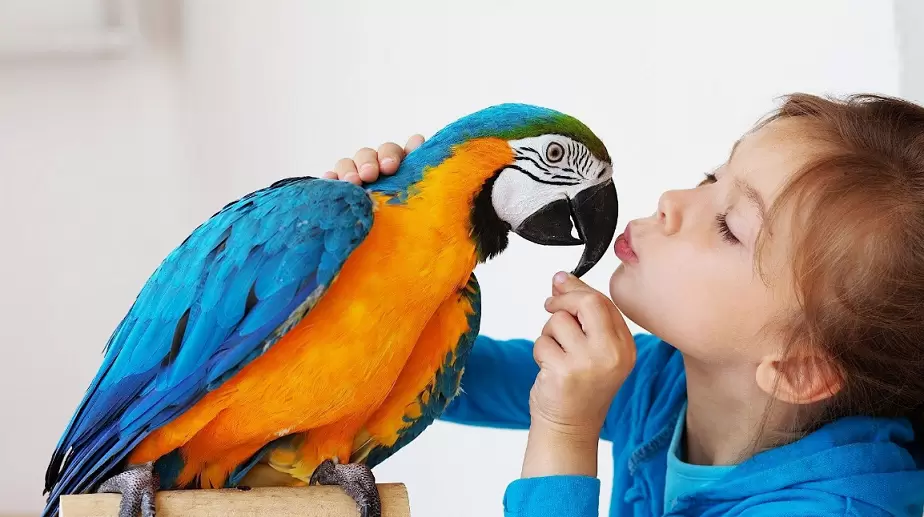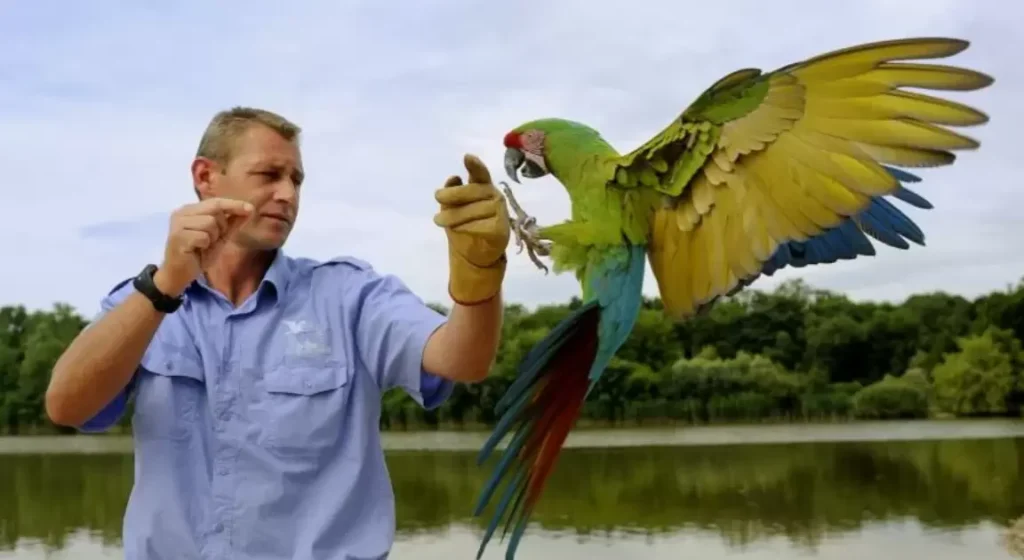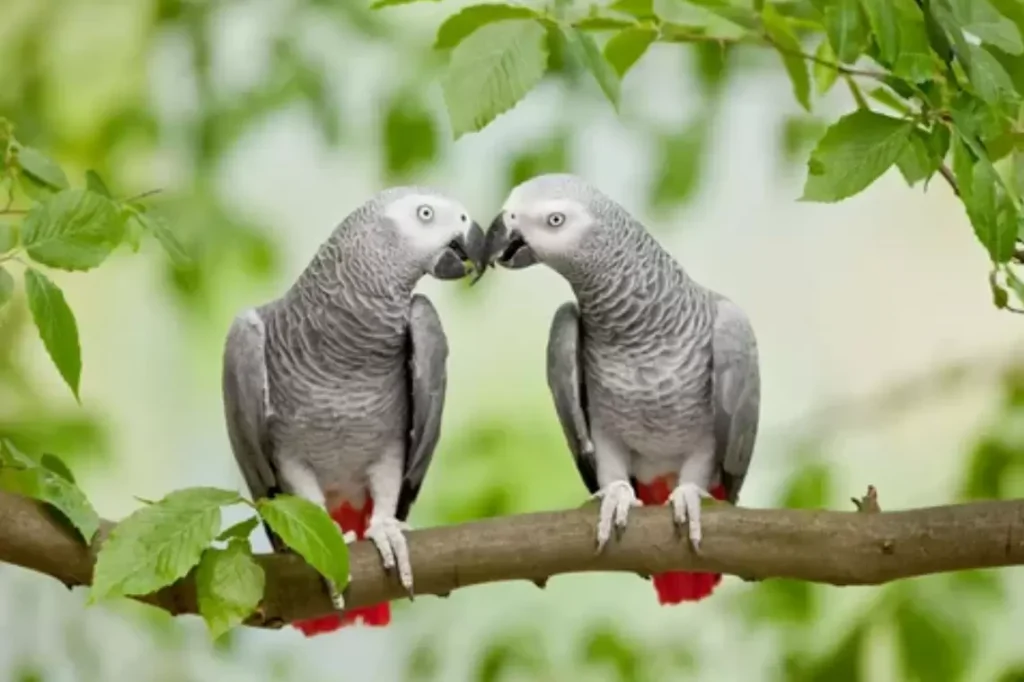Parrots are relatively social, smart birds that have captivated humans for centuries. Their ability to imitate sounds and expressions, in addition to capacity for bonding, lead them to fascinating pets.
However, many people question whether these relationships are truly empathetic and loving, or if parrots love merely imprint on their owners as chicks or fledglings without forming deeper attachments.
Through various studies and observations of pet parrots in homes, we’ve gained insights demonstrating these bonds can be profound.
Parrots Prefer Humans as Flock Members:
When kept as companion animals, parrots tend to favor human company above other animals. One study observed the social preferences of 20 pet parrots from various common household species like Amazon parrots, cockatoos and macaws.
[1]. Their behaviors in response to their owners and strangers were recorded. Strikingly, 93% of the parrots greeted their human caretakers with obvious displays of excitement like stepping up eagerly onto hands, singing or whistling. In contrast, they were indifferent or timid towards unknown humans entering the room.
This preference extends beyond just their main caretaker too. In another experiment, pet macaws were given a choice between photos of their owners or unfamiliar people.
Their eyes lingered far longer on images of family over strangers, showing they form a “mental representation” of close associates [2]. So while parrots enjoy flock activities with other birds, they clearly choose their human family above all when forming social bonds.
Signs of Affection:
There are distinct behaviors pet parrots love exhibit to demonstrate their bonds with favorite humans. Perhaps the most outward display is eagerly hopping or flying eagerly into owners’ hands or bodies when summoned.
Well-trained birds see their humans as safe perches and a way to be near their flock leader. Physical signs of affection like nibbling, kissing and gentle beak nudges are also commonly seen, especially during grooming sessions.

Vocal cues can be quite revealing too. Some cockatoos are famous for their kissing noises towards owners. Others like Amazons like to mimic terms of endearment. Grays may even tell knock-knock jokes or hum love songs at their favorite person’s approach.
Calm, relaxed body language and soft cooing vocalizations in their presence are further subtle signs of trust and attachment. With new humans though, fear or bristle feathers may be visible instead as they ensure safety within their flock.
Reciprocal Caretaking Relationships Parrots love:
The emotional care and concern clearly flows both ways within human-parrot pair bonds. While parrots rely on owners for protection, nourishment, mental stimulation and gentle touch, humans gain therapeutic benefits too from these relationships according to research surveys.
Companion parrot caretakers consistently report feeling less stressed, isolated and more joyful in their lives thanks to the constant affection, entertainment and sense of purpose from having a feathered family member.
[3]. Parrots demand attention, play and positive socialization daily in ways not so different from caring for children. Therefore, a deep personal bond develops between responsible owners and their birds that shares parallels with human-canine or even husband-wife relationships based on nurturing, trust and teamwork.
Emotional Intelligence on Par with Children:
To understand this bond depth, one must appreciate a parrot’s mental complexity. Their problem-solving skills, memory ability and emotional intelligence matches 3-5 year old kids according to comparative testing.
[4]. Just as young children need approval, bonding and daily engagement for healthy development, parrots too express distress through self-destructive behaviors if left lonely or bored in cages without meaningful interaction.
Parrot hobbyist support communities online post many rescue success stories where even abused, neglected parrots rediscover the capacity for gentleness and intimacy with patient owners. Like humans, these birds possess neuroplasticity allowing them to transform from fearful to faithful companions given the right nurturing home life.
New research argues certain brain regions in parrots love are analogous to areas regulating social behavior in primates [5]. In many ways, we share kindred flock instincts and cravings for kinship which transcend species when given opportunity.
Satisfying Deepest Parrot Needs:
While feathers and beaks may differ from our own, parrots love undoubtedly have interior emotional worlds which caretakers strive daily to enrich. The basics of food, water and safe housing provide security for their physical requirements.
However, many parrot experts argue their spirits truly take flight, so to speak, through human interaction forms like:

- Training and play sessions using positive reinforcement
- Daily scratches, pets and scratches with soft hands
- Novel stimulation activities with foraging challenges
- Quiet bonding time perched beside their favorite human
- Tactile appeasement gestures mirroring grooming behaviors
- New objects, toys or puzzles tailored for various species needs
- Compassionate discipline avoiding fear, harm or neglect
Busy lifestyles can challenge keeping birds content nevertheless. Creative owners find fulfilling solutions whether it be perching a bird in their home office for social hours or hiring occasional bird sitters while traveling.
Ultimately, preventing boredom through novelty, socialization and intellectual puzzles daily nurtures the complex inner nature of parrots to form meaningful interspecies unions of parrots love, care and trust with humans.
Choosing the Right Parrot Companion:
Some types of pet parrots are better suited as only pets or for larger households than others. Here’s a brief overview:
- Cockatoos tend to bond strongest to one person and demand immense amounts of time, training and attention daily from patient owners.
- Conjures make playful pets but require lots of interactions to prevent noise issues.
- Macaws are long-lived, gentle giants best for experienced owners who can provide a sizable, enrichment filled environment.
- Amazons and other smaller parrots may adjust to families with children better if introduced gradually and properly disciplined.
- Rescue birds need an even more tailored approach understanding previous care history could impact behaviors requiring extra commitment.
Researching species needs thoroughly and consulting parrot adoption groups regarding personality match greatly increases the chances of a life-long, fulfilling relationship for both bird and humans within the colony. With correct pairing though, pet parrots love have much love and joy to share for decades.
Part of the Flock Forever:
While average parrot life spans in captivity now reach 25-50+ years, outliving multiple human generations, their spirits live on familiarly.
Perhaps our eternal curiosity about these creatures stems from detecting fragmentary pieces of ourselves within them – their craving for bonds, mental stimulation and place within a caring social circle taps something primal within us too as society has molded humankind increasingly disconnected from nature.
When the time eventually comes to say goodbye to a beloved feathered friend, grieving owners take solace that for years that bird knew deep fulfillment, purpose and around-the-clock adoration from their primate companions.

Both human and bird hearts grow infinitely richer for the joining of souls across boundaries. The rewards of opening one’s home alongside patience and devotion creates families transcending flesh alone – families which last lifetimes in memory, spirit and the echoes of whistles mimicking “I love you” onto future flocks.
Frequently Asked Questions (FAQs):
Q: Do parrots fall in love with their owners?
A: It is not natural for a parrot to bond to a human being.
Q: Do parrots actually love you?
A: It hasn’t been scientifically proven if birds can love or not.
Q: Do parrots recognize their owners?
A: Birds do recognize human faces and voices.
Q: Which parrot is most friendly?
A: Budgies, or Parakeets.
Q: What do parrots love the most?
A: vegetables such as kale, zucchini and shredded carrot.
Conclusion:
This article aimed to shed light on the little understood but very real emotional lives of parrots love. Through studies and observations, we’ve seen how these intelligent birds preference human interaction and form profound social bonds resembling those within families.
With sensitive care catered to an individual parrot’s needs, the rewards are a mutually enriching relationship extending far beyond basic pet ownership.
For parrots love and people alike, the connection illuminates our shared capacities for trust, love and finding purpose through compassionate care for others regardless of feathers or skin. May the future bring expanding appreciation for these sentient beings’ complex inner worlds.

Edward Charlie has been a dedicated blog writer since 2008, amassing 16 years of experience in the field. Throughout his career, he has developed a keen ability to craft engaging, well-researched content that resonates with a diverse audience. Edward’s extensive background has allowed him to master various blogging niches, from technology and lifestyle to science and culture. His commitment to quality writing and insightful analysis has not only refined his skills but also earned him a reputation as a trusted voice in the blogging community. Passionate about his craft, Edward continues to explore new topics and trends, delivering content that informs and captivates his readers.